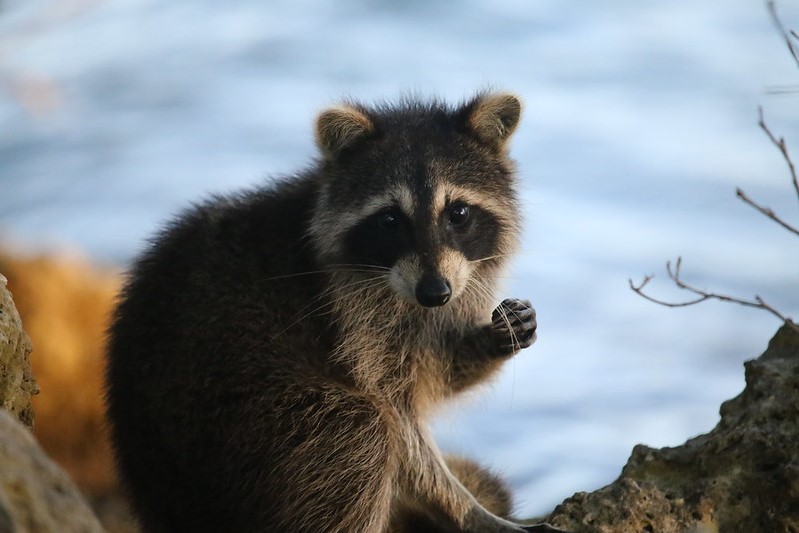(St. Lucie, County) – The Florida Department of Health in St. Lucie County (DOH-St. Lucie) has extended the rabies alert originally issued on November 9th by 60 days. DOH-St. Lucie is also expanding the geographical area of the alert to include all of St. Lucie County after a positive rabies test for an aggressive raccoon outside of the initial alert area.
As of November 24, there have been seven animals that tested positive for rabies in St. Lucie County. These animals include one domestic dog, one cat, four raccoons, and one bat. The public is asked to maintain a heightened awareness that rabies is active in St. Lucie County and to take precautions to protect themselves and their pets. DOH-St. Lucie wants all residents to be aware of the risk that rabies poses to St. Lucie County residents and their pets. By remaining alert and taking some simple precautions, we can all help to reduce the spread of this deadly disease.
Pets should be vaccinated against rabies to protect both the pets and their owners. Rabies is a fatal disease that can be spread to humans, so it is important to take precautions to protect yourself and your pets. Vaccinating your pet against rabies is one step you can take to help keep your family safe.
The following are steps you can take to protect yourself and your loved ones against rabies:
- Rabies is a deadly virus that can infect any warm-blooded animal, including pets. It is important to keep your rabies vaccinations up to date so that you and your pet are protected from this deadly disease.
- If your pet is bitten by a wild animal, seek a veterinary assistant for the animal immediately. This is important not only to ensure that your pet receives the necessary medical attention but also to protect other people and animals from potential diseases carried by the wild animal.
- If there are any stray animals in your neighborhood, call your local animal control agency to have them removed. This will help keep your neighborhood safe and clean.
- One of the best ways to help reduce the number of unwanted pets is to spay or neuter your own. When pet owners take responsibility for their animals, it helps cut down on the number of animals that end up in shelters or without proper care. Vaccinations are also important for preventing the spread of disease, so make sure your pets are up to date on their shots.
- One way to prevent attracting wild animals to your property is to make sure your garbage cans are closed and not overflowing with trash. Litter can also attract wildlife, so be sure to clean up any litter around your home. If you have pet food or birdseed outside, be sure to store it in a secure container so that animals can’t access it. By taking these simple steps, you can help keep wild animals away from your home.
- When you adopt a wild animal, you are taking on a lot of responsibility. Not only do you have to provide food and water, but you also have to provide a safe and comfortable home for the animal. Wild animals can also be dangerous, and they may attack or injure people or other animals in your home. It is best to leave wild animals in their natural habitat.
- Teach children not to handle unfamiliar animals, even if they appear friendly. Children should never touch or go near animals they don’t know, even if the animals look friendly.
- Bats should be kept out of living quarters to prevent them from coming in contact with people and pets. They can spread diseases like rabies, so it’s important to take measures to keep them out. One way to do this is by installing a bat-proofing system on your home. There are also repellents available that can help keep bats away.
Residents should take precautions to avoid contact with both wild and stray animals, as any of these could potentially carry rabies. Rabies is a serious infection that can be spread through bites, scratches, or contact with the animal’s saliva, so it is important to take caution. Vaccinating your domestic animals against rabies is one way to help protect yourself and others, and avoiding contact with wildlife, especially raccoons, bats, foxes, skunks, otters, bobcats, and coyotes are also advised. If you do come into contact with a potentially rabid animal, seek medical attention immediately.
If you see an animal that is behaving strangely, please report it to your local animal services so that they can handle it.
• St. Lucie County Animal Control 772-462-8120
• Port St Lucie Animal Control 772-871-5042
• Fort Pierce Animal Control 772-467-3149
If you are bitten or scratched by a wild animal or stray, it is important to report the incident to your doctor immediately. You should also contact local animal services and the local county health department. The contact number to report an animal bite to DOH-St. Lucie is 772-462-3883.
If you have an unvaccinated pet, please take action now and get your pet vaccinated. For more information on low-cost rabies vaccinations being offered by local community partners, you can contact:
• The Humane Society of St Lucie County 772-466-7387
• Animal Hospital of West Port St. Lucie 772-344-8800
Professional Wildlife Removal
If you have wildlife issues on your property, it is best to contact a professional wildlife removal service. These services are trained in handling wildlife and will be able to safely remove the animals from your property.
There are several different methods that can be used to remove wildlife from your property, and the type of method used will depend on the type of animal you are dealing with.
Our wildlife removal, AAAC wildlife removal can help you with all of your wildlife needs. We are trained and experienced in handling all types of wildlife, and we will work quickly and efficiently to remove the animals from your property. Contact us today for more information.
If you have questions about this content, please contact the administrator.
The news originally from: https://www.wjhg.com/content/news/Countywide-rabies-alert-extended-after-6th-animal-tests-positive-for-virus-508057411.html




